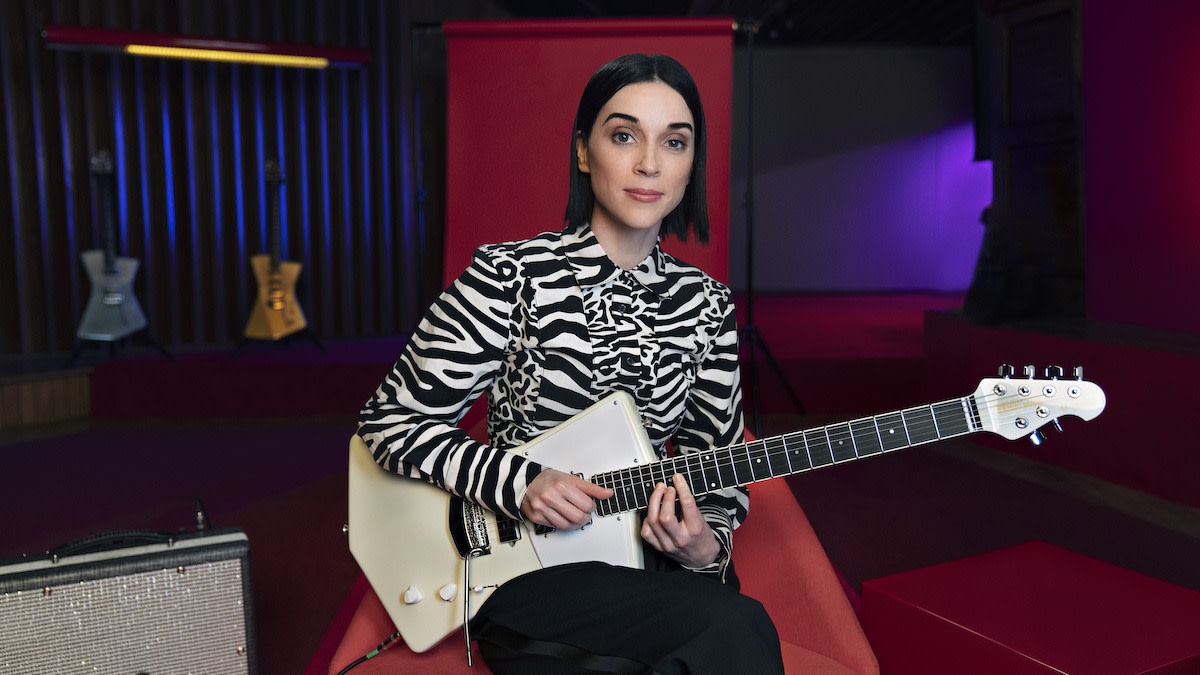St. Vincent’s Tips for Beating Songwriter’s Block
Written by MasterClass
Last updated: Jun 7, 2021 • 4 min read
Songwriter's block is a creative barrier that stymies a writer’s process. Award-winning musician St. Vincent offers her tips for overcoming songwriter’s block.
Learn From the Best
If you're an aspiring musician stuck in a creative rut and unable to write new music, you're not alone. Even successful professional musicians like St. Vincent struggle to overcome songwriter's block. The good news is that St. Vincent has several methods for rediscovering your creative muse.
A Brief Introduction to St. Vincent
Virtuosic and artistically daring, Annie Clark—who borrowed the moniker St. Vincent from a Nick Cave song—is a true twenty-first century rock star. She’s won Grammys and countless critical accolades, she’s scored films and produced albums for other artists, and she’s shared a stage with everyone from David Byrne to Dua Lipa—even fronting Nirvana for a night. Beginning with her head-turning 2007 debut, Marry Me, up through her bold, Grammy-winning 2017 album, Masseduction, she’s made her unique mark on the musical landscape with a sound that combines acrobatic guitar riffs, indelible melodies, and flashes of absurdist humor.
What Is Songwriter’s Block?
Songwriter's block is a phenomenon experienced by musicians that is best described as a creative barrier preventing you from moving forward and writing new songs. This inability to produce new music does not indicate that you’re unskilled as a songwriter or that you lack commitment to your craft, but rather that you’re merely struggling to overcome a temporary mental obstacle.
St. Vincent’s 6 Tips for Overcoming Songwriter’s Block
Annie Clark, who performs under the moniker St. Vincent, is an acclaimed singer and songwriter, and she’s perfectly suited to help aspiring musicians overcome songwriter's block.
- 1. Write first and edit later. "I just make things, and I'm not judging them when I'm making them," Annie says. "I save the editing part, I save the critical part for after." A common cause of songwriter's block is the desire to create a masterpiece, but if you're too much of a perfectionist, you'll never finish writing a song. When you switch your brain into edit mode as you write, it interrupts your momentum, stops your creative flow, and pushes you backwards in the writing process. Keep your creative brain firing on all cylinders, by accepting that perfection will come later. In the beginning, it’s most important to simply finish your rough draft. You can focus on editing afterward.
- 2. Tune in to your inner creative voice. "The more you tune into your inner voice, the more it will give to you," Annie says. The trick is not to let distractions overwhelm your thoughts. If you tune out your inner voice too often, the voice gets quieter, and it becomes harder to access your own creative potential.
- 3. Keep a notebook of ideas. "When you're just going about your day not writing, if you see something that's inspiring or have a thought, write it down," Annie says. Inspiration may strike when you least expect it, and you don't want to forget a good musical idea. Make it part of your routine to write down ideas for lyrics or melodies. Even if you don't use an idea right away, you may use it when you're writing songs later—or it could lead you to other new ideas. Sometimes Annie will wake up in the middle of the night with a melody in her head, and she'll quickly record it on her phone and fall back asleep. Whether you prefer to write down a note on a piece of paper or record a voice memo on your phone, you'll now have that idea as a source of inspiration to use in the future to overcome songwriter's block.
- 4. Step away from your creative process. "If you're stuck, take a shower you don't need to take. Sometimes, the second you step away from the creative process the perfect idea arrives," Annie says. There's a difference between active engagement and passive engagement, and at times Annie realizes she needs to simply step out of her studio, put her normal routine on pause, and let the creative process happen more naturally. Just make sure not to use this break as an excuse to completely abandon your work schedule. Whether Annie decides to take a shower, listen to a podcast, or grab a snack, she always treats her passive activity as a part of her creative process.
- 5. Silence your inner critic. "Half the battle of writing is sitting with yourself in uncomfortable positions where you're hoping something happens,” Annie says. “If you turn the voice of that inner critic down as much as you possibly can, then you can just generate." It's normal to think negative thoughts and feel like a fraud, but it’s a problem when you let your emotions take over and throw you out of your creative rhythm. It's not always easy, but you have to push through those feelings of doubt.
- 6. Sitting down to write is half the battle. "Part of the process is just sitting there and hoping that the train rolls through the station," Annie says. "As the old adage goes, 'If you want to get hit by the train, you gotta stand on the tracks.’" Even when you're struggling to find the motivation to write songs, make it a habit to just sit down and see what happens. It may seem like you don't have a good idea at the time, but you never know what you’ll discover simply by being present and strumming away on your guitar.
Want to Learn More About Music?
Become a better musician with the MasterClass Annual Membership. Gain access to exclusive video lessons taught by the world’s best, including St. Vincent, Christina Aguilera, Sheila E., Timbaland, Itzhak Perlman, Tom Morello, and more.
